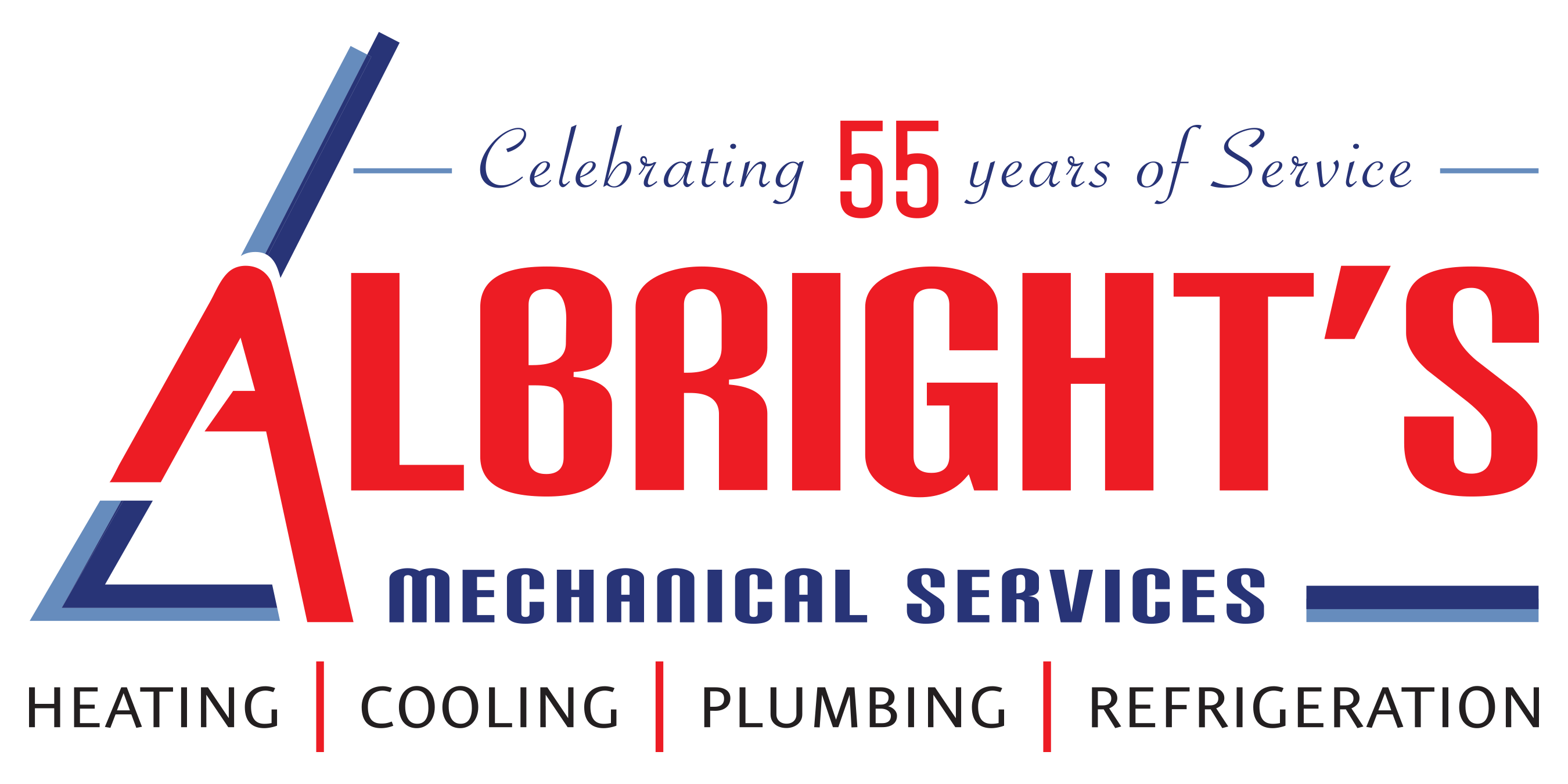
Baltimore AC Repair
Serving the AC Needs of Baltimore Homes for 50+ Years
In the summer, a functioning air conditioning system is important for keeping your home cool and your family comfortable. Since 1970, Albright's has provided AC repair in Baltimore. We offer the best quality air conditioning equipment and expert service to meet the requirements of every customer. We strive to respond to every call within 24 hours or 48 hours at the latest.
If you are looking for professional AC repair services in Baltimore, MD or the surrounding area, look no further. Our team of AC experts have combined years of experience and use only high-quality air conditioning material and equipment for all AC repairs. Customer success and satisfaction is our very top priority, and we take pride in delivering top-notch services at affordable prices.
Having trouble with your air conditioner unit? Contact us online or call (410) 834-0148 for exceptional repair services in Baltimore.

Common AC Problems
An air conditioner is a must-have to get through a Baltimore summer, so it’s essential that you know how to prevent common problems with your AC unit.
These are some of the most common issues we see with AC units:
- Weak airflow or reduced cooling power
- Leaking or flooding from the drain pan into your home
- Fan issues
- Frozen evaporator coil
For information on how to diagnose and prevent these issues, read more below or simply call us today.
At Albright's Mechanical Services, our Baltimore AC repair experts are here for all of your air conditioning needs. Contact us online or call us today at (410) 834-0148!

How to Prevent Your AC from Breaking
1. Weak Airflow or Reduced Cooling Power
As air conditioners age, they gradually lose their efficiency. Once they get close to the 15-year mark, you’ll probably notice that your energy bills are a bit higher, and your AC might not cool your home as effectively as it once did.
However, if you’re noticing cooling issues with your newer air conditioner, like weak airflow or hot and cold spots around the house, it’s time for some investigation.
How to Prevent this Problem: First and foremost, make sure you are replacing your air filter as often as your AC needs you to. Even though most manufacturers say their air filters last up to 90 days, make it a habit to check on yours after 45, 60, and 75 days as well. Remember, the more you use your AC, the faster the filter will get dirty.
Next, thoroughly check each room in your home for any blocked vents. Now make sure all of those vents are open. Your AC system needs to take in as much air as it sends out: when you close vents in an attempt to control the temperature in specific rooms, you actually create a pressure imbalance in the system that can lead to efficiency problems.
Lastly, it’s always a good idea to schedule annual preventative maintenance for your air conditioner. Routine maintenance helps your system stay in tip-top shape for as long as possible and reduces the chance of a breakdown.
2. Leaking or Flooding from the Drain Pan Into Your Home
While cooling your home’s air, your air conditioner also dehumidifies it. The moisture (condensate) that your AC draws out of your air collects in a drain pan, and from there, the condensate exits your home through a pipe called the condensate drain line.
Dust, mold, mildew, algae, and other grime can sometimes clog this drain line. When that happens, the water is blocked from leaving your home, so it will start to fill up your drain pan. Unless something clears the drain line, the water will flood over the sides of the drain pan and leak into your home.
How to Prevent this Problem: You can routinely clean the drain line yourself or even flush it if necessary. If you already have a technician coming out to perform a spring tune-up on your AC every year, then they will take care of this for you.
It’s also important to recognize that newer AC units are a lot more efficient than old ones, so they can extract a lot more moisture than an older unit. When installing a new unit, check with your HVAC contractor to see if your current drain line is adequate.
3. Fan Issues
Your fan is a critical component in your air conditioner. It keeps air moving through the entire system, not only pushing cold air into your home but also preventing problems in your AC that result from lack of airflow.
When your fan isn’t working properly, you could end up with overheating components, a frozen evaporator coil (which we’ll get into below), or compressor failure. A compressor failure means no cool air, and it is costly to replace.
How to Prevent this Problem: The best way to avoid a fan problem is annual preventative maintenance. During the appointment, the technician will have the opportunity to spot issues with the motor or point out other problems to you, such as a worn belt, a build-up of dirt and debris, or a lack of lubrication.
Throughout the year, you can also prevent fan issues by listening for any strange noises coming from your air conditioner so that you can call for a repair before extensive damage is done.
4. Frozen Evaporator Coil
The evaporator coil is located inside your air conditioner’s indoor unit. Refrigerant travels through the evaporator coil, where it absorbs the heat from your indoor air, “cooling” it. The coil also draws out moisture from the air, so it collects condensate that drips down into a drain pan.
If your air filter gets too dirty, or if your AC has a blower fan problem, this can prevent adequate airflow from blowing over the evaporator coil. Without enough warm air blowing over the coil, the condensate can freeze on the metal, reducing the coil’s ability to cool your indoor air. Frozen coils can also result from low refrigerant levels or a thick layer of dust coating the coil.
How to Prevent this Problem: The most important thing you need to do is replace your AC’s air filter regularly so that it doesn’t block airflow into your system. The next most important thing is to keep up with your system’s preventative maintenance. During the appointment, the technician will check the refrigerant levels and provide the system components with the cleaning and lubrication they need to function properly.
The Importance of AC Maintenance
In the same way that we get our teeth cleaned twice a year and change the oil in our cars, it's very important to routinely maintain your air conditioner. Failure to do so could mean reduced performance, more frequent breakdowns, and a shorter lifespan for your system. Air conditioners are big investments, so make sure you protect them by having them serviced at least once per year.
When to Replace Your AC System
Many people are unsure whether their air conditioning unit is in need of AC repair or if a replacement is needed. Fortunately, there are some tell-tale warning signs you can keep an eye out for.
Warning signs include:
- The age of your system. Most experts, including the officials at EnergyStar.gov, say that an AC system that’s nearly 10 years old, or older, could be ripe for failure. While some cooling systems last longer, it’s common for increased AC repairs and performance problems to appear as the average system approaches its 10th birthday.
- Spiking utility bills. Sometimes, a higher-than-normal utility bill has to do with the weather for the past month or two. But when you notice a couple months of higher utility bills without any reasonable explanation, the most likely culprit is an AC system struggling to cool your home.
- Uneven cooling. Perhaps the upstairs is cool and comfortable while the downstairs won’t dip below 80 degrees, or vice-versa. As cooling systems move toward the need for replacement, you’ll often notice uneven temperatures throughout the home. In some cases, the system struggles to adequately cool rooms furthest down the air duct system from the main unit.
- Signs of moisture. Whether you see drips that indicate a leak or signs of condensation in the duct system, moisture that wasn’t previously present is a sure sign that the system either needs to be fixed or replaced. The moisture is a concern because it can breed mold, which can cause problems for people in the home with respiratory problems such as asthma and allergies.
- Odd noises. Is your cooling system making banging noises or other loud noises that you’ve never noticed before? That’s a common sign that the system is failing, according to experts. Sometimes, unusual noises also signal the need for AC repairs, but we’ll come out and let you never whether it’s time to buy a new system or not.
- Frequent repairs. An AC repair or two doesn’t mean that your system is on its final legs. Yet, all cooling systems require more repairs as they get older. The more frequently you need to call for AC repair, the better the chance that your cooling system is about to fail.
Experience the Albright Difference
If you are looking for professional air conditioning repair services in Baltimore, MD, or the surrounding area, you can count on our professionals to provide you with high-quality services. We use the latest technology and will go above and beyond to ensure the optimal functioning of your air conditioner. Contact us to learn more about what we can do to make your home a better and more comfortable place for you today!
Call us at (410) 834-0148 for all your AC repair needs in Baltimore, MD, or contact us online.
Recommended Reading:
Make It Right - Call Albright's!

-
“Thank you for taking great pride in your job and going above and beyond.”
Christy Kopp -
“From those answering the phones to their technicians, the service provided is outstanding.”
Sam L. -
“I always turn to Albright's Mechanical Services for my heating and air conditioner service.”
Mary G. -
“He was very meticulous solved the problem and then cleaned my system.”
Liz B. -
“Great experience. A+. 5 Stars.”
Ken L.
Benefits of Working with Our Expert Team
-
Call or Contact Albright's 24/7
-
We'll Schedule Service Right Away
-
Experience Reliable Service with a Smile
-
Enjoy Your Regained Comfort


Request Your Service
- Dundalk
- Essex
- Rosedale
- Towson
- Middle River
- Edgemere
- White Marsh
- Joppa






